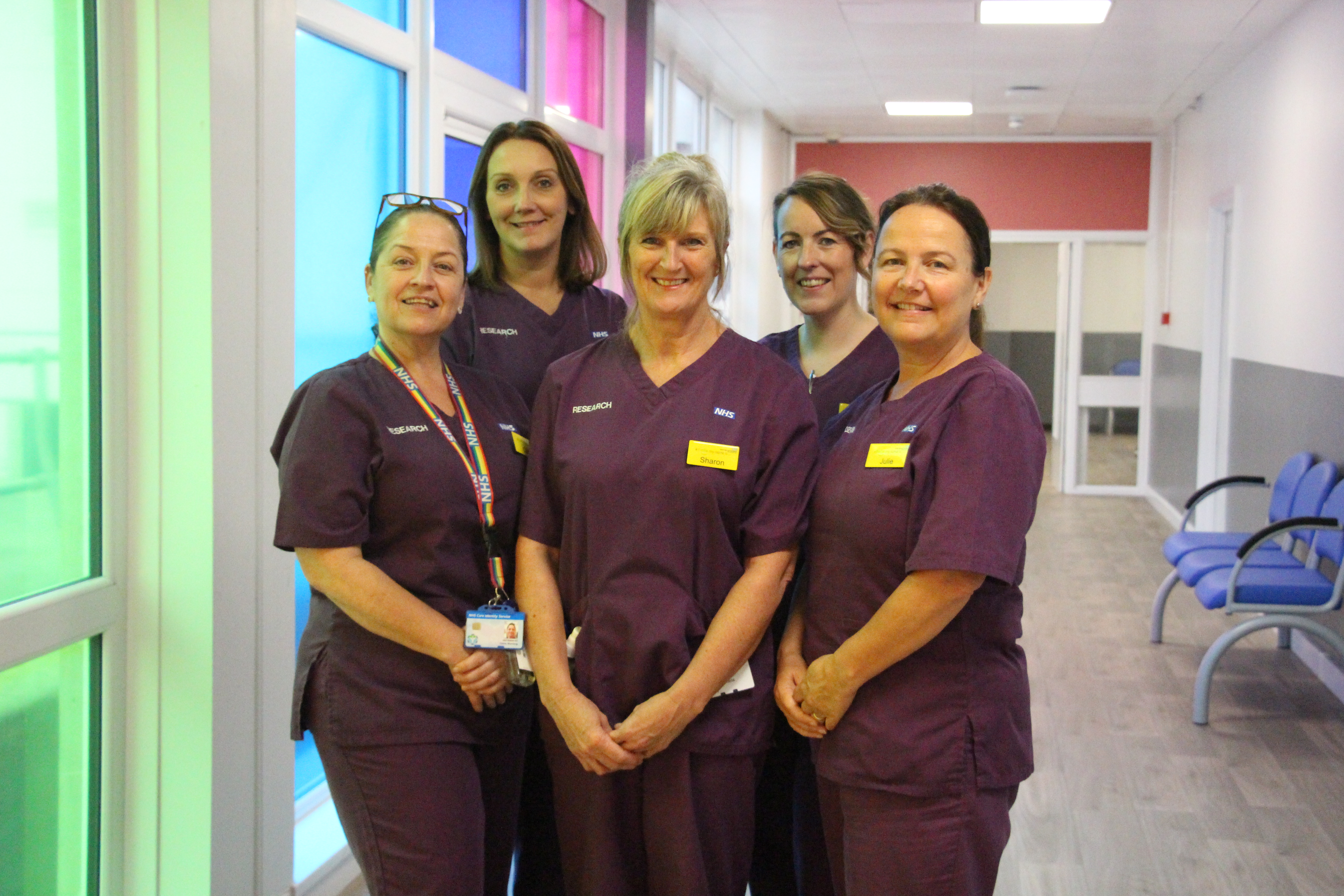
At our Trust, we carry out research to gather evidence on what works in maternity services so that we can deliver the best possible care for women, children and their families – now and in the future.
We are committed to placing research at the core of clinical care and aim to offer opportunities for research involvement to as many patients as possible. Having an active maternity research team ensures we are involved in helping develop better treatments, tests and care pathways in pregnancy and beyond.
Taking part in our research studies is optional. If we offer you the chance to participate, you will be given information and plenty of time to ask questions and find out more before you decide.
Your clinicians may also discuss specific studies directly with you if they are relevant and suitable for your care.
Keep a look out in the clinical areas, on social media and on our website for information about different studies we are currently participating in.
Your maternity research team
- Sharon Gowans – Research midwife
- Kirsty Farrington – Research midwife
- Julie Woollaston – Research midwife
- Vicky Collins – Research associate practitioner
- Claire Morning – Clinical trials assistant
Open studies
COPE
Excessive bleeding after childbirth (also known as postpartum haemorrhage or PPH) is a common problem which affects one in 20 women. COPE is a research study to compare two drugs currently used to treat PPH, to decide which is better. The two drugs are carboprost and oxytocin.
iGBS3
Group B Strep (GBS) is the most common cause of life-threatening infection in newborn babies in the UK. Despite a risk based approach to treatment, rates of GBS infection in the UK are rising.
To prevent more GBS infections, we need a vaccine. Vaccines against GBS are already in development and being tested. If one or more vaccines are shown to be both safe and effective, they could be offered to pregnant women to protect their babies against this devastating infection. However, we do not yet know what level of antibody is needed to protect babies against GBS infection in their first three months of life – without that, scientists can’t easily license a GBS vaccine for pregnant women.
The iGBS3 trial is collecting a small amount of cord blood from the placenta after baby is born to find out information about the amount of antibody that protects babies from GBS infection. The researchers can then establish what the components of a GBS vaccine need to be to reduce GBS infection in babies.
Ingr1d2 Study
Type 1 diabetes affects 1 in every 250 children born in the UK every year. It’s incurable and insulin replacement therapy brings many serious life-long challenges for patients and their families.
Numerous trials of potentially therapeutic agents have been tried and failed in patients already diagnosed with the disease. Our alternative approach is to try to prevent the root causes of the disease long before insulin dependency and clinical diagnosis. Because type 1 diabetes is strongly inherited we can identify those newborn children at greatest risk of the disease by genetic testing.
About 1 in 100 babies will have a risk of developing type 1 diabetes later in life – that is 25 times higher than the general population, increasing the risk from 1 in 250 (as in the general population) to 1 in 10. We will invite these ‘1 in 100’ children to take part in the prevention trial (SINT1A). We won’t take an extra blood sample, just using the blood spots collected routinely by the NHS as part of the ‘heel prick’ test taken a few days after birth.
SNAP3
This study is looking to optimise the use of Nicotine Replacement Therapy (NRT) as a smoking cessation aid during pregnancy. NRT, such as nicotine patches, contains nicotine, but is free from harmful chemicals found in cigarettes.
Using NRT is safer than smoking and it reduces the urge to smoke and can make it easier to stop smoking. Stopping smoking in pregnancy is one of the best things a woman can do for her baby’s health. The NHS offers NRT for free to pregnant women to help them stop smoking.
This study is testing whether some new ways of using NRT can help women to stop smoking and could improve women’s and babies’ health.
FACT 4 Child
This is a follow up study. Women participated during pregnancy in a previous study called Folic Acid Clinical Trial (FACT). In FACT, we looked at women potentially at risk of developing pre-eclampsia during pregnancy.
Pre-eclampsia is hypertension (high blood pressure) in combination with protein in the urine in pregnancy. FACT 4 Child is following up on children born to mothers who previously participated in FACT.
The researchers will be examining childhood developmental outcomes in relation to folic acid supplementation throughout pregnancy.
TTTS Registry
We are collaborating with the UK national registry for multiple pregnancies, an exciting project funded by the Twin and Multiple Birth Foundation (TAMBA) aimed at answering the many questions we still have about the best way to look after women with a multiple pregnancy and their babies.
Information from multiple pregnancies across the UK is entered onto this registry in an anonymised way; in other words, there is no way of identifying individual women from the information stored on the registry. The purpose of this registry is to address gaps in existing knowledge about multiple pregnancy in order to inform clinicians, women and babies about the best treatment to offer in multiple pregnancies that develop complications, and the best ways to monitor women and babies for the development of these complications.
This will ultimately improve the care we provide to these women and babies. Furthermore, the registry will help us to ensure that all units caring for women with multiple pregnancies in the UK are providing consistent, evidence-based care. The registry will also provide a platform to allow long-term follow-up of these children at a national level.